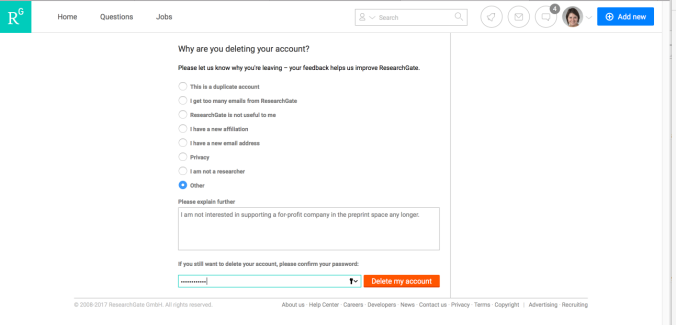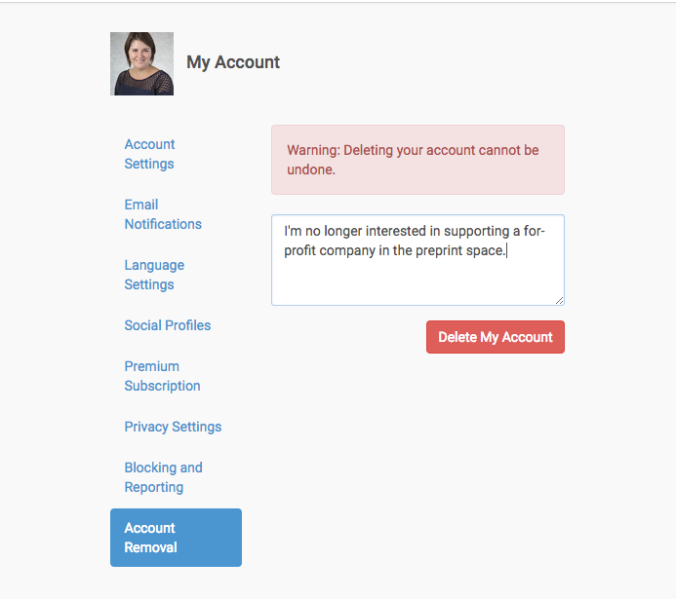There’s lots of stuff I should be doing right now (most imminently, preparing syllabi), but I’ve been meaning to do this for a while. Specifically: I want for-profit companies academia.edu and ResearchGate.com out of my life.
Luckily, psychology now has a robust, not-for-profit alternative allowing us to share both pre-prints and post-prints*, a service called PsyArXiv. Here are seven reasons I hope you’ll join me now (or even slowly, migrating your work over time):
-
- Open Access: You want your work to be freely available, even to scholars who don’t have library access and the general public. For most psychology journals, you don’t have to pay an OA fee to make your (un-typeset) work freely available to all.
- Higher Citation Rates: Work that is made accessible tends to be accessed and used more. PsyArXiv tracks your download counts, and I can confirm that it is weirdly satisfying to see those numbers tick up over time.
- Indexed by Google Scholar: When people search for your work on Google Scholar, they’ll get directed to your freely accessible pre-print.
- Link to Published Work: You can assign DOIs to your pre-prints on OSF, and if applicable you can associate the pre-print with the DOI of a published paper.
- Version Control: With preprints on PsyArXiv, you can easily update your work to the latest version, while simply keeping track of earlier versions. Readers get the latest version – perfect for incorporating corrections and updates.
- Archive and Preserve: PsyArXiv is hosted by the Open Science Framework, and content there is backed by a $250,000 endowment to ensure your work is stably hosted. Storage on PsyArXiv is designed to be more reliable and longer lasting than storage on your personal website or computer.
-
Supported and Maintained by the Research Community: We researchers already cede too much control of our work to for-profit publishers – why give for-profit entities any leg up at all in the preprint space? This one is easy: I’ll choose instead to support the site that is maintained by my peers**.
You can check out this PsyArXiv blog post (and the others) to learn more about the preprint initiative.
So you’re on board? Here’s how to do the same:
- Post your author formatted copies of your papers on PsyArXiv***. You can check SHERPA/RoMEO to make sure it is OK to post your own copies of your published or accepted papers (it is for most psych journals).
- Delete any .pdfs you are hosting on academia.edu or ResearchGate.com. If you have co-authors who have posted copies of your work, consider asking them to take those copies down. (Here’s how I did so.)
- Delete your academia.edu and ResearchGate.com accounts. It’s in the settings area for both sites. Here’s my screen grabs from doing so:
The last step is to tell your colleagues and share on social media. I bet if we work together we can give for-profit preprint hosts the boot. Will you join me?
* Terminology- To me a pre-print is a “working paper” that has not yet been accepted for publication, whereas a post-print is a published paper that you’re sharing on a pre-print server like PsyArXiv. Some people use working paper or draft paper to correspond to the pre-acceptance stage of a paper, pre-print to mean the “Online Advance” copy, and post-print to mean the final formatted paper after it is in a particular issue of a journal. I think it’s fair to say that not everyone uses these terms super clearly or consistently, myself included. [back]
** Shameless promotion – PsyArXiv was developed at SIPS 2016 and continues to be maintained by a board, chaired by the awesome Ben Brown. +1 for community-driven improvements! [back]
***One thing to consider is how to license your work when you post on PsyArXiv. CC0 and CC-BY are two licensing options that allow greatest re-use of your work (e.g., in educational settings, in future works like edited collections). You can read more here. Thanks to Chris Hartgerink for raising this key point! [back]

